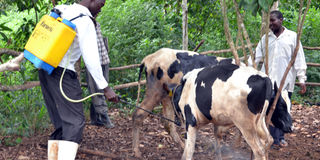Sigh of relief as govt lifts 2-year animal quarantine in Nakaseke

A farmer has his animals sprayed against ticks at a farm in Nakaseke District in May. Farmers in the district are calling for mass vaccination of livestock in order to contain the Foot-and-Mouth Disease once and for all. PHOTO/DAN WANDERA.
What you need to know:
But the lifting of the quarantine comes with strict guidelines, for instance sale of livestock and their products must only be on farms under the supervision of a public veterinary officer.
Farmers from three sub-counties in Nakaseke District can now earn from their respective livestock after government lifted a two-year long livestock quarantine slapped on the areas to contain the spread of Foot-and-Mouth Disease (FMD).
The three sub-counties that have been under quarantine since 2019 include Ngoma, Kinoni and Ngoma Town Council.
However, the lifting of the quarantine restrictions comes with tough guidelines in line with the prevailing conditions and guidelines earlier announced by government as per the presidential directives on the prevention of Covid-19 pandemic.
Under the new guidelines, sale of livestock and their products must only be on farms under the supervision of a public veterinary officer, with the knowledge of the village chairperson and the parish chief.
The animals must move on trucks only for slaughter purposes, adhering to all FMD biosecurity measures.
The commissioner for animal health in the Ministry of Agriculture, Animal Industry and Fisheries, Dr Anna Rose Adamun, in a July 29 letter addressed to the Nakaseke District Chief Administrative Officer (CAO), states that the quarantine restrictions have been lifted after strategic ring vaccination against FMD was carried out in the affected areas, with supported evidence from laboratory tests indicating the containment of the disease.
“The purpose of this communication, therefore, is to inform you that the quarantine restrictions imposed on Ngoma Town Council, Kinoni and Ngoma sub-counties have been lifted with conditions hereunder,” Dr Adamun’s letter reads in part
Mr Enock Nyongole, the Nakaseke North MP, said livestock farmers in the area have endured the quarantine through the two successive Covid-19 induced lockdowns, which limited their abilities to take care of their families without any alternative sources of income.
“Cattle corridor areas purely depend on the sale of livestock products and our people could not meet their family basics under the lockdown since their source of livelihood had been affected. It is good that FMD is now under control in the affected areas,” he said in telephone interview on Monday.
The persistent animal quarantine imposed on areas where FMD has been detected in Nakaseke District is partly the reason why the district has continued to perform badly in terms of local revenue collections.
Nakaseke District chairperson, Mr Ignatius Kiwanuka Koomu, told this newspaper on Sunday that mass vaccination for all livestock in the cattle corridor areas is the best solution to FMD.
“The fact that we have porous borders where animals from different areas cross in and out of the country makes the containment of FMD disease tricky. Government must plan for mass vaccination of all animals against FMD. Our areas have been crippled by the persistent animal quarantines. Our farmers purely depend on livestock products for survival and any attempt to stop the transaction in the animal products affects the entire district,” he said.
Mr Edmond Ssendagire, a farmer in Ngoma Sub-county, Nakaseke District, said they had almost given up on government promises to have the quarantine lifted.
“The farmers claimed that their respective areas were now free from FMD, but the veterinary officers insisted that government would only lift the quarantine after sample results from the different areas conducted at the government laboratories prove that FMD was no longer a threat. It is our appeal that strict measures are put in place to stop animals crossing into the district without FMD clearance certificates,” he said.
Last month, government imposed quarantine restrictions in Kakooge Sub-county in Nakasongola District after FMD was detected by veterinary teams. Kakooge Sub County neighbours Nakaseke District.
About FMD
Foot and mouth disease (FMD) is a severe, highly contagious viral disease of livestock that has a significant economic impact. The disease affects cattle, swine, sheep, goats and other cloven-hoofed ruminants. It is a transboundary animal disease (TAD) that deeply affect the production of livestock and disrupting regional and international trade in animals and animal products
The first FMD outbreak in Uganda was recorded in 1953. Since then, they occur annually and do not seem to follow a particular pattern.
In 2014, FMD hit about 30 districts across the country and the government imposed quarantine on the sale of beef and other dairy products. The quarantine was lifted six months later.
The disease struck again last year and several livestock farmers in the cattle corridor districts lost a number of animals. Recently, livestock experts working with Private Sector Foundation Uganda (PSFU) asked government to investigate the various strains of FMD virus to avert further outbreaks. According to experts, a blanket solution like vaccination prior to identifying virus serotypes could cause more losses to the farmers. They argued that the strains of FMD experienced in Uganda differ from district to district and no single vaccine can cover all the livestock at ago.





